| Article ID | Journal | Published Year | Pages | File Type |
|---|---|---|---|---|
| 2614287 | Wilderness & Environmental Medicine | 2014 | 6 Pages |
ObjectivePhysical activity is a cornerstone in therapy for patients with metabolic syndrome. Walking and hiking in a mountain scenery represents an ideal approach to make them move. The Austrian Moderate Altitude Study (AMAS) 2000 main study is a randomized controlled trial to investigate the cardiovascular effects of hiking at moderate altitude on patients with metabolic syndrome compared with a control group at low altitude, to assess a potential altitude-specific effect.MethodsSeventy-one male patients with metabolic syndrome were randomly assigned to a moderate altitude group (at 1700 m), with 36 participants, or to a low altitude group (at 200 m), with 35 participants. The 3-week vacation program included 12 hiking tours (4 per week, average duration 2.5 hours, intensity 55% to 65% of heart rate maximum). Physical parameters, performance capacity, 24-hour blood pressure, and heart rate profiles were obtained before, during, and after the stay.ResultsIn both groups, we found a significant mean weight loss of −3.13 kg; changes in performance capacity were minor. Systolic, diastolic, and mean arterial pressures and circadian heart rate profiles were significantly reduced in both groups, with no differences between them. Consequently, the pressure-rate product was reduced as well. All study participants tolerated the vacation well without any adverse events.ConclusionsA 3-week hiking vacation at moderate or low altitude is safe for patients with metabolic syndrome and provides several improvements in their cardiovascular parameters. The cardiovascular benefits achieved are more likely to be the result of regular physical activity than the altitude-specific effect of a mountain environment.
